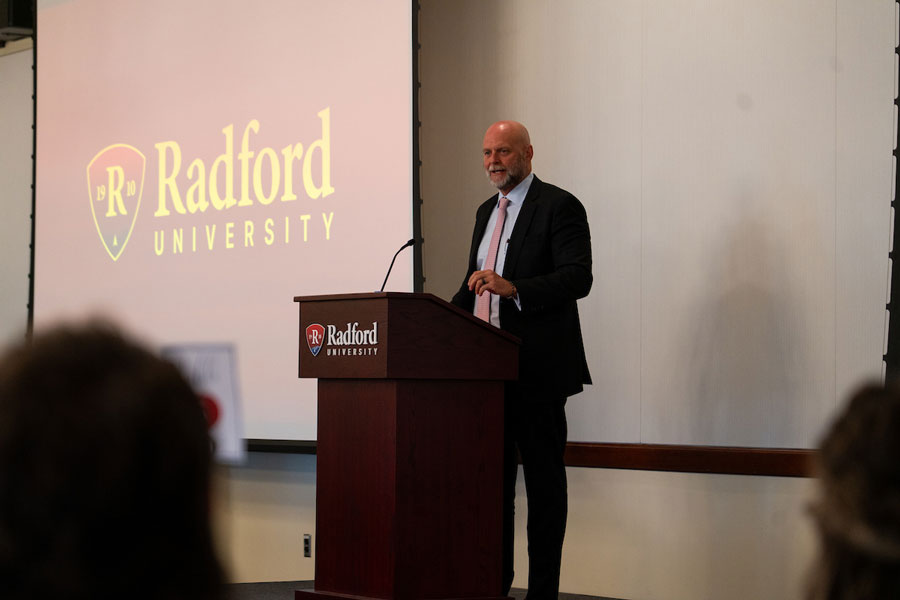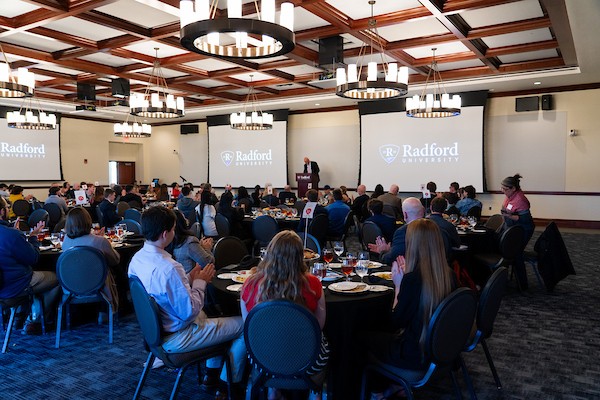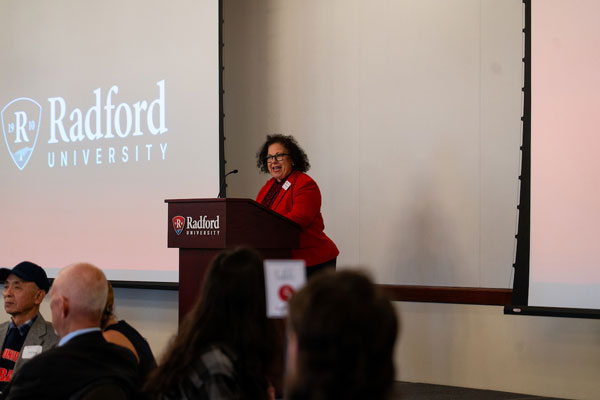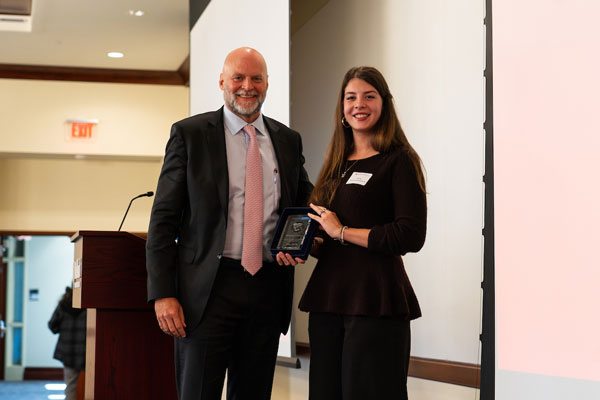“Play off the front foot”: Financial advisor Bill McNulty ’91 shared straight talk, life lessons with students
by Neil Harvey
November 17, 2025

Today, Bill McNulty ’91 is a senior vice president with Morgan Stanley and a financial advisor with more than three decades of experience in fields like portfolio management, wealth and estate strategies and asset allocation.
And as you read that introduction, you probably picture someone who was bound for certain success from an early age, a guy virtually born wearing a tailored suit and a crisp, expensive necktie.

But in his Nov. 6 address, as this fall’s guest speaker for the Truist Global Capitalism Lecture Series, McNulty quickly dispensed with that stock image to serve up a speech that was both inspiring and instructional.
“I am a lifelong C student,” he declared, sounding a little more like the street-smart comedian Bill Burr than, say, Warren Buffett. “I had to go to summer school in high school, and I went to summer school three years down here in Radford. It was awesome. I had a lot of fun.”
As enjoyable as those undergraduate years might have been, however, McNulty wasn’t able to fly above the turbulence indefinitely. Juggling school, lacrosse and an extremely active social life ultimately took a toll on his GPA, and after his first year, he said, poor grades nearly got him bounced out of school.
“Next stop is the military,” his mother warned him when she learned of his academic jeopardy.
And that marked the pivot at which he decided he needed to make good on the high potential he’d always possessed but had never really leaned into.

“I made that commitment to myself, and I started showing up to class,” McNulty told his audience of students and faculty. “I started paying attention, started going to see them [professors] for office hours, and guess what? They cared about me. They went above and beyond. So, leverage your network.
“I’ve learned more from my failures than I have from anything else,” he added, “but one thing I learned as I went through this journey was never give up on myself, right? Never quit.”
McNulty’s rebound propelled him through graduation and into the workforce, but he still had to overcome the legacy of his C-student standing by doing time in entry-level positions, specifically in one of Merrill Lynch’s mailrooms. A far cry from finance, it was a position that often required him to ferry deliveries from the post office to his main office.
“I would see people on the street that I went to school with … and they’re like, ‘I thought you worked at Merrill Lynch?’ and I’d be pushing my dolly with, like, three mail bags, 80 pounds each, and it’s August,” he recalled. “But I was like, ‘I don’t care. I’m in.’”
Besides tempering his resolve, that stint in the trenches gave him opportunities to gather foundational knowledge. A sales manager, whom he still praises, helped him hone his business fashion sense early on, and other senior colleagues offered career advice that he took. He clocked in early, stayed late and rose to become first a financial advisor, then ultimately an executive.

McNulty eventually landed at Morgan Stanley and has now been there for a quarter of a century.
It was a path many others have trod before him, and still more will undertake in his wake.
“Look, you’re going to get knocked in the face when you graduate,” he advised the students. “You work, [and] it’s going to stink at some points. But just get up off the ground, get out there and play off the front foot.
“I look at all these young, young, wonderful minds out there,” he said. “You will solve all the world’s problems.
“And for anybody in the room who’s over 55 – you will go on to pay all of our Social Security, so I’m going to thank you for that,” he added with a wry chuckle.
“You guys are the next generation of the market. You guys are going to graduate. You guys are going to get jobs. Some of you are going to work for private companies. Some of you are going to work for public companies. But you guys are what's going to raise the boats for everybody else.”
McNulty’s address included his list of common-sense financial practices for young people just starting out on their own. Here are some of the key points:
- “When you graduate, if you can live at home for as long as possible, please do it,” he said, with the idea being that during that period, graduates bank a specific estimate of whatever money their expenses would have cost them. McNulty said his twin sons lived at home for about a year after college, and while he collected rent and board from them for their stay, when they moved out, he gave that full sum back to them to use as a financial foundation. “Do it for as long as your parents will allow it.”
- Once graduates start work, McNulty said, they should contribute at least 10% of their income to their retirement accounts. “Next year, do 11%. Two years from now, up it to 12%. Regardless of what happens, don’t stop that contribution.”
- Having a credit card is a necessity to build a credit rating, he said, and also helps against security fraud in day-to-day transactions. “Use your credit card. Don’t use your debit card except in the bank or at the ATM. But I want to be crystal clear on this: You pay off your credit card every single month. ... Do not carry a balance on your credit card. It will kill you,” while paying off the balance each month will gradually increase a fledgling credit rating.
- “If you want to buy a car, please buy a used car versus a new car, because used cars have already depreciated. Buy a car that you think you’re going to be in legitimately for the next seven years.”
- “Some of you are going to have student debt. That’s [something] you have to make payments on. Make sure that’s in your strategy with your retirement plan. You’re doing something to slowly retire your debt, because long-term debt can kill you. What you don’t do is neglect your debt. ‘Oh, it’ll take care of itself,’ right? No, it won’t take care of itself. So, you’ve got to make sure you’re making those payments.”